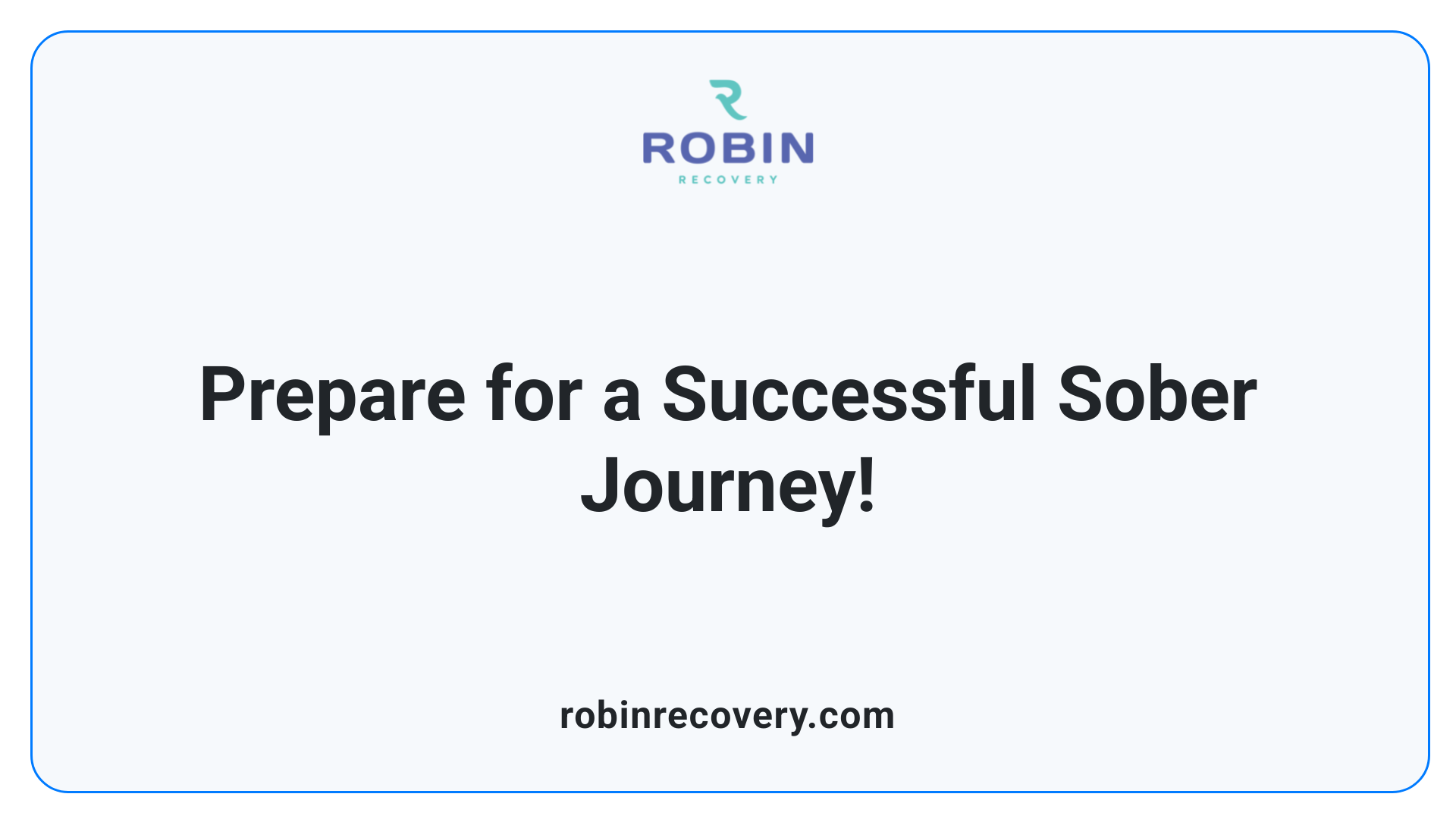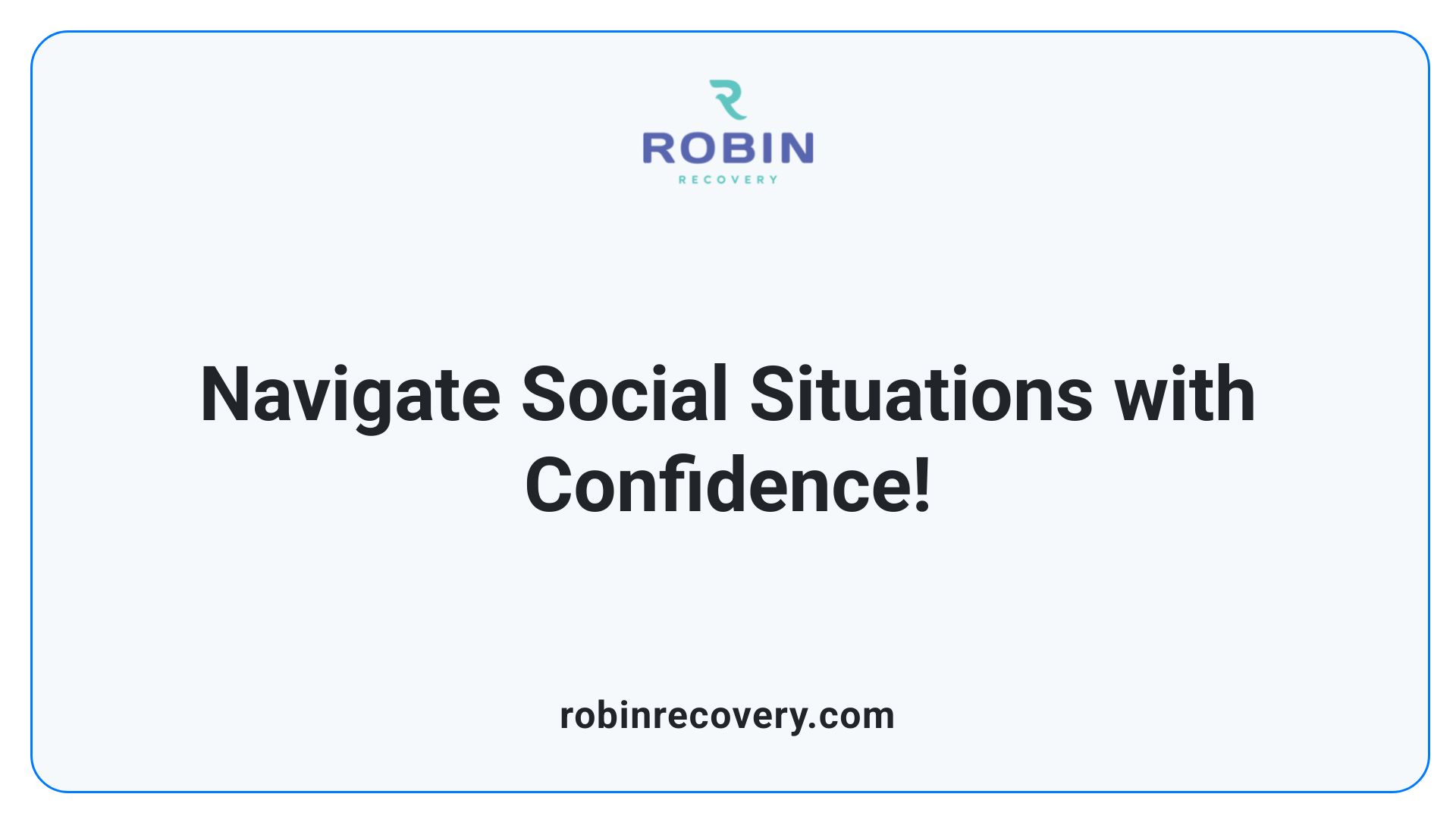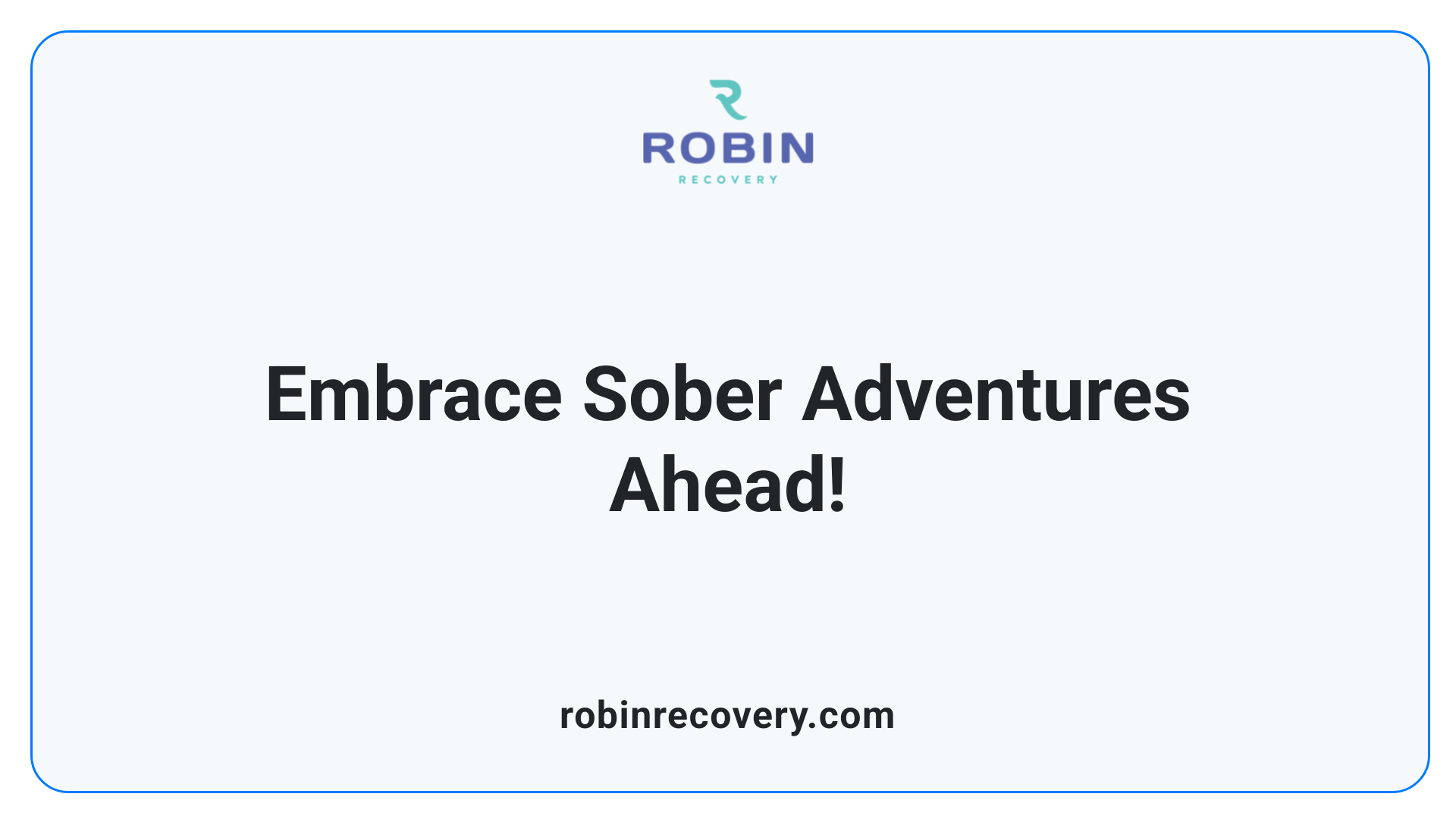How to Stay Sober While Traveling

Embrace a New Way of Traveling
Traveling can be an incredible opportunity to explore new places, cultures, and experiences. However, for those committed to maintaining sobriety, navigating the challenges of travel can be daunting. This article provides comprehensive guidance and inspiring insights to help you enjoy a fulfilling, alcohol-free vacation. Whether you're in recovery or choosing a sober lifestyle for personal reasons, this guide offers strategies to stay centered and committed during your travels.
Setting the Foundation: Intentions and Preparations

Setting Intentions for Sobriety Travel
Setting a clear intention before embarking on a trip is vital to staying sober. Take time to reflect on your reasons for travel and visualize your desired outcomes. This mental preparation aids in reinforcing your commitment to sobriety.
Discuss your travel intentions with a therapist or a trusted friend. Their support can provide accountability and encouragement, helping you stay focused on your goals.
Importance of Pre-Travel Preparation
Pre-travel preparation involves not just organizing your itinerary, but also identifying potential triggers. Airports are often full of temptations; come prepared with healthy snacks and stay hydrated, avoiding bars and stressful situations. Planning begins with understanding your destination—research local customs, activities, and identify sober-friendly environments to help manage cravings and urges.
Additionally, unique social situations can arise. Prepare responses for these moments and create strategies for avoiding high-risk situations.
Creating Travel Goals Aligned with Sobriety
Creating specific travel goals that align with your commitment to sobriety can enhance your travel experience. Aim to engage in non-alcohol-based activities such as local tours, nature hikes, or cooking classes that offer cultural immersion without alcohol.
Staying connected to your support system throughout the journey can provide emotional stability. Consider packing recovery toolkit items such as a gratitude journal to document positive experiences, and an action plan for how to handle moments of temptation.
By setting strong intentions, preparing thoroughly, and creating sober-aligned goals, your travel experience can be enjoyable and fulfilling, free of the burdens of substance use.
Managing Triggers and Cravings on the Road

How can I manage triggers and cravings while vacationing?
To effectively manage triggers and cravings while on vacation, begin by identifying specific triggers that may arise during your trip. Common scenarios include being in an airport, attending parties, or frequenting places where alcohol is served. Understanding these situations in advance helps you devise a plan to navigate them.
Coping strategies for handling cravings
Once you have identified your triggers, develop coping strategies to handle cravings when they occur. Consider the following techniques:
- Mindfulness and meditation: Practicing mindfulness can ground you in the moment, helping you to observe cravings without acting on them.
- Physical activity: Engage in activities such as hiking, swimming, or yoga. These can serve as great distractions and also provide a sense of accomplishment and well-being.
- Stay occupied: Fill your itinerary with fun and engaging activities, like cooking classes or cultural tours, to focus on the experience rather than alcohol.
Support systems for sobriety
Additionally, establish a strong support system. Communicate your intention to remain sober with friends or family traveling with you, so they can offer encouragement. Explore recovery apps or virtual meetings to connect with support groups. If possible, seek out local sobriety meetups at your destination for face-to-face connections. Building this network prior to your trip can make a significant difference in managing your sobriety. Remember, cravings are temporary; using techniques like deep breathing will aid in navigating intense urges effectively.
Planning Sober Activities and Choosing Supportive Companions
What strategies should I use for planning sober activities and choosing supportive companions when traveling?
Planning a sober trip starts with researching sober-friendly destinations. Opt for places known for their low alcohol culture, or those that offer a range of healthy and engaging activities. Locations that emphasize wellness, such as beach resorts with yoga retreats or cities renowned for art and culture, can create an enriching travel experience.
Next, select activities that don't involve alcohol. Look for options like:
- Guided hikes that allow you to explore nature.
- Cultural tours that introduce you to local traditions and cuisine.
- Wellness retreats focusing on mindfulness practices.
- Cooking classes that emphasize healthy recipes.These activities not only align with your sobriety goals but enrich your travel experience, encouraging mindfulness and presence.
Additionally, it is crucial to travel with individuals who are supportive of your sobriety. Choosing empathetic travel companions who respect your lifestyle is integral to maintaining your focus. Before traveling, communicate your sobriety intentions with your companions to establish expectations. Engaging with supportive travel communities or opting for sober travel groups can enhance the experience and provide a network of encouragement.
Always be prepared for potential challenges by having personal coping strategies in place, such as mindfulness techniques or a recovery toolkit. Being intentional about your planning helps ensure that your travel is fulfilling and aligns with your commitment to sobriety.
Enjoying Travel Without the Influence of Substances

How can I enjoy travel without alcohol or drugs?
To enjoy travel without alcohol or drugs, focus on immersing yourself in the culture, cuisine, and natural beauty of your destination. This approach emphasizes meaningful experiences instead of the typical drinking-focused activities. Consider these activities:
- Visit Alcohol-Free Venues: Explore local coffee houses, juice bars, or mocktail lounges where you can socialize in a non-drinking environment.
- Engage in Outdoor Adventures: Activities like hiking, kayaking, or biking not only provide an adrenaline rush but also keep you away from places where alcohol might be the center of attention.
- Explore Cultural Experiences: Attend local theater performances, art exhibitions, or traditional cooking classes. Engaging in these activities offers a glimpse into the area's culture while keeping you entertained.
- Document Your Journey: Keeping a gratitude journal during your trip can help you focus on the positive aspects of your journey rather than any cravings.
Creating meaningful experiences without alcohol
Effective planning plays a crucial role in creating enjoyable and sober travel experiences. Prior to your trip, research destinations that promote alcohol-free activities. Having a structured itinerary filled with alternative activities can help you stay engaged and focused. Some ideas include:
- Guided Tours: Opt for cultural tours that explore local history or architecture.
- Spa Days: Treat yourself to wellness activities, such as massages or yoga classes, instead of typical bar-hopping.
- Food Tours: Savor the local cuisine, allowing culinary experiences to replace the social aspect of drinking.
Maintaining a healthy travel routine
Establishing a routine can significantly ease the pressure of being surrounded by social cues to drink. This can include setting morning activities that promote productivity and positivity, thereby diminishing nighttime temptations. Furthermore, consider these strategies:
- Stay Hydrated and Nourished: Keep your body fueled with nutritious foods and enough water, which helps in combating cravings.
- Connect with Support: Utilize technology to stay in touch with your support system. Schedule virtual meetings or stay in contact with sober friends to maintain accountability and motivation.
- Cultivate Mindfulness: Practice mindfulness techniques, such as meditation or mindful breathing, that can help ground you, especially in stressful situations.
By implementing these strategies, traveling sober can lead to profound personal experiences, enabling you to embrace your adventure fully while prioritizing your well-being.
Handling Social Pressures in the Sober Traveler's Journey

Preparing for Social Situations
Travel can present various social situations that may challenge your commitment to sobriety. Preparation is essential. Familiarize yourself with potential pressure points—these could include parties, dining out, or unexpected gatherings. Have a plan in mind for how to navigate these instances.
Strategies to Deal with Peer Pressure
When faced with peer pressure, it is beneficial to rehearse polite but firm responses to decline alcohol offers. Phrases like “I’m driving” or “I’m focusing on my health” can serve as effective ways to steer clear of unwanted temptations. Surrounding yourself with individuals who support your sobriety adds an extra layer of assurance. If you communicate openly with your travel companions about your commitment to sobriety, it fosters a stronger understanding and respect for your choices.
Creating a Supportive Vacation Environment
Choosing sober-friendly activities and locations helps alleviate the burden of social pressures. Consider hosting your own gatherings that focus on activities other than drinking. Setting clear boundaries about alcohol and having exit strategies can empower you, allowing you to navigate social situations confidently while maintaining your sober lifestyle. By creating a positive and supportive vacation environment, the journey can transform from a potential pitfall into an opportunity for fun and connection without the need for alcohol.
Overcoming Travel Hurdles Without Turning to Substances
How can I navigate travel challenges without using substances?
To navigate travel challenges without resorting to substances, it's vital to approach your trip with intention. Here are several strategies to consider:
- Set Your Intentions: Before your journey, crystalize your reasons for traveling and visualize a successful sober experience. Discuss these intentions with a trusted friend or therapist to solidify your commitment.
- Handle Triggers Proactively: Identify your triggers, particularly those that arise during travel, like airport temptations. Keep hydrated by drinking plenty of water and packing healthy snacks to manage cravings.
- Remove Temptations Early: Upon arrival at your accommodation, request that the minibar be emptied to eliminate easy access to alcohol, and discuss your sobriety commitment with your companions.
Addressing Anxiety and Stress During Travel
Anxiety and stress can increase the urge to drink. To counteract these feelings:
- Maintain a Routine: Try to stick to a travel schedule similar to your daily one. Consistency can ease stress and reduce cravings.
- Engage in Mindfulness: Incorporate techniques such as mindful breathing or journaling to stay grounded and focused.
- Plan Energizing Activities: Schedule invigorating morning activities like hikes or guided tours. Having plans can deter late-night temptations and promote a healthy mindset.
Creating Sober Social Experiences
Engaging in social settings can be challenging, but with the right approach, it can be gratifying:
- Seek Alternatives: Explore local culture through activities like cooking classes, art tours, or participating in sober tours that emphasize adventure over alcohol consumption.
- Connect with Like-Minded Travelers: Join events or meet-ups with individuals who share your sober lifestyle, providing a supportive and enjoyable environment.
- Explore Non-Alcoholic Options: Many destinations now offer an array of non-alcoholic drinks, such as mocktails or artisanal sodas, allowing you to enjoy social experiences without compromising your sobriety.
In summary, navigating travel challenges without using substances is achievable through proactive planning, maintaining supportive connections, and engaging in fulfilling activities.
Learning from Sober Travel Experiences
What insights and encouragement can be drawn from others' experiences in sober travel?
Sober travel offers a transformative experience that fosters clarity, self-discovery, and genuine connections. Many travelers find joy in participating in activities such as tubing and zip-lining, creating a supportive sober community while exploring new destinations. These adventures not only provide fun but also build camaraderie among those committed to sobriety.
Personal stories from sober travelers highlight the enriched memories created when one chooses to engage fully in their surroundings. Embracing every moment without the haze of alcohol can lead to experiences that are both memorable and deeply fulfilling. This shift in focus allows for a more mindful spending of resources—travelers often save money by abstaining from alcohol, which frees up funds to spend on activities that enhance their trip.
Ultimately, insights from these shared experiences encourage individuals in recovery to embrace the richness of life. By forming authentic connections with like-minded travelers and engaging in new adventures, sober travelers can enjoy their journeys in a fulfilling manner—one that they can fully remember and cherish without the influence of alcohol.
Exploring the Sober Tourism Movement
What are the current trends in sober tourism and activities?
Current trends in sober tourism showcase a growing interest in health-conscious travel experiences, particularly among younger generations like millennials and Generation Z. This demographic is driving a noticeable demand for alcohol-free options within the travel industry. The market for non-alcoholic beverages has expanded significantly, with many travelers actively seeking out alcohol-free bars and establishments, presenting a challenge to traditional drinking culture.
Popularity of Non-Alcoholic Activities
Destinations known for their outdoor allure, such as Iceland and Costa Rica, are becoming increasingly popular among sober travelers. These locations not only offer stunning natural landscapes but also promote engaging activities like hiking, kayaking, and yoga, all conducive to maintaining sobriety. Many major hotel chains are adapting to this trend by introducing creative non-alcoholic drink menus, enabling guests to enjoy social experiences without the need for alcohol.
Growth of Sober-Friendly Travel Options
Moreover, wellness tourism is on the rise, with many resorts and travel companies focusing specifically on sober-friendly experiences. Activities such as mindfulness retreats, fitness boot camps, and adventure tours are being highlighted, allowing individuals to immerse themselves in rejuvenating experiences while fostering sober habits.
As the sober travel movement continues to grow, it is clear that the focus is shifting towards enriching travel experiences that promote health, well-being, and community without the influence of alcohol.
The Future of Travel: Embracing Sober Adventures

Strategic Planning for Future Sober Travels
To ensure successful sober travel experiences, strategic planning is paramount. Start by setting clear intentions regarding your alcohol consumption—this mindset will guide your choices throughout the journey. Next, consider your triggers, particularly at common temptation spots like airports. Prepare by having healthy snacks and non-alcoholic drinks on hand to stay occupied and hydrated during your travels.
Building Sustainable Sober Travel Practices
Building sustainable practices for sober travel is essential for long-term sobriety. Choose travel companions who respect your commitment to sobriety while also engaging in activities that do not revolve around alcohol. Joining organized sober tours or retreats can be an excellent way to connect with like-minded individuals and foster positive experiences without the temptations of drinking.
Emphasizing the Long-term Benefits of Sobriety in Travel
The long-term benefits of maintaining sobriety during travel extend far beyond the trip itself. By reframing vacations as opportunities for self-care and personal growth, travelers can enjoy greater physical well-being and mental clarity. Incorporating mindful practices like gratitude journaling not only enhances the travel experience but also strengthens the emotional toolkit necessary for navigating future challenges.
With these strategies, the future of travel can increasingly cater to the sober crowd, encouraging exploration, personal connections, and enriched experiences without the overshadowing role of alcohol.
Discover the Richness of Sober Exploration
Traveling sober offers a unique opportunity to engage deeply with the world around you, free from the distractions and fog of substances. Through mindful preparation, embracing new experiences, and building a supportive community, you can transform your travels into enriching journeys of personal growth and discovery. Remember, sober travel is not just about abstaining from alcohol or drugs—it’s about creating authentic, memorable experiences that enhance your life and leave lasting impressions. Embrace the possibilities of sober travel, and discover the joy of experiencing the world with clarity and purpose.
References
- Traveling While Sober: 9 Tips for Your Best Vacation Yet
- The Ultimate Guide to Enjoying a Sober Vacation
- Wanna Stay Sober on Vacation? 7 Tips to Help
- How To: Destinations for Sober-Curious Travel ...
- 9 Tips to Stay Sober on Vacation
- 7 Important Tips for Traveling While Sober and Having an ...
- How to Stay Sober on Vacation: 7 Tips for Success - Monument
- Sober tourism is a growing trend—here's how it can ...
- Tips To Stay Sober On Vacation
- Overcoming Social Pressures to Drink Post-Recovery
